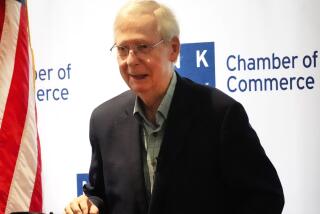Arafat’s Sickly Appearance Raises Questions About Health, Succession
- Share via
JERUSALEM — Palestinian Authority President Yasser Arafat, who has appeared to be ailing for months, looked so pale and shaky at a weekend news conference in Switzerland that a journalist inquired about his health as a matter of international concern.
“How do I look to you?” Arafat asked with a smile.
“You look teary-eyed. Your lips are shaking. You’re speaking slowly. You’re pale,” the American reporter replied.
Arafat blanched even further at the description of himself that was being broadcast in Israel and the Palestinian-ruled territories and quickly switched from English to his native Arabic to say that he was merely tired.
Despite the dodge, the encounter served to bring the subject of Arafat’s clearly deteriorating health onto the front pages of Israeli and Palestinian newspapers.
Although people who work closely with Arafat say he is as alert and hard-working as ever, his tremors are fueling worry about possibilities for salvaging the Israeli-Palestinian peace process. And the lack of a clear heir in the Palestinian hierarchy is feeding speculation about the possibility of a violent struggle to succeed the 68-year-old Arafat.
Palestinian officials deny suggestions that his trembling lips and hands are symptoms of Parkinson’s disease. They say he is working too hard and is often depressed over the collapse of the peace process. But they insist that reports of his ill health are Israeli propaganda to weaken the Palestinian leader.
Ahmed Korei, speaker of the Palestinian Legislative Council, was quoted on the front page of the Palestinian daily newspaper Al Quds on Monday as saying that Arafat is in good health and that rumors to the contrary were meant to “create divisions among the Palestinian people.”
Foreign diplomats who meet regularly with Arafat say that, while some Israeli reports of his ill health are exaggerated, his condition is worsening. He sometimes speaks haltingly or stares into space for short periods. “He has not looked very good now for about two months or so,” said a Western diplomat who sees Arafat regularly. “His arms and legs always shook [in recent years], but the lower lip is new and his color has not looked good.”
Most political observers concur that Arafat’s current condition does not appear to affect his mental capacity or put him in immediate danger. Still, as when a plane he was in crashed in the Libyan desert in 1992 and in the case of numerous assassination attempts over the years, Arafat’s condition has reminded Middle East players of his mortality and has raised questions about Palestinian politics after him.
In large part, the problem has been created by Arafat, who has defeated all political challenges over the last 30 years and centralized power in his own hands. Arafat holds several key posts besides being president of the Palestinian Authority: He is chairman of the Palestine Liberation Organization executive committee, chairman of his Fatah movement’s central committee and commander of the Palestinian armed forces.
And there is no clear line of succession. The Basic Law, or Palestinian constitution approved by the Palestinian legislature, says that, in the event of need, the speaker of parliament, now Korei, takes over from the president for an interim period until elections can be held. But Arafat has never signed the Basic Law.
Mahmoud Abbas is secretary-general of the PLO executive committee, making him No. 2 in that organization. But neither Korei nor Abbas has Arafat’s popularity. And many Palestinians fear a bloody power struggle among leaders of the Palestinian security services.
“Arafat should ratify the Basic Law,” said Khalil Shikaki, director of the Palestine Center for Research and Studies in the West Bank city of Nablus. “Then he should abandon this Stalinistic system in which one person holds all these positions. He must strengthen institutions.”
More to Read
Sign up for Essential California
The most important California stories and recommendations in your inbox every morning.
You may occasionally receive promotional content from the Los Angeles Times.










